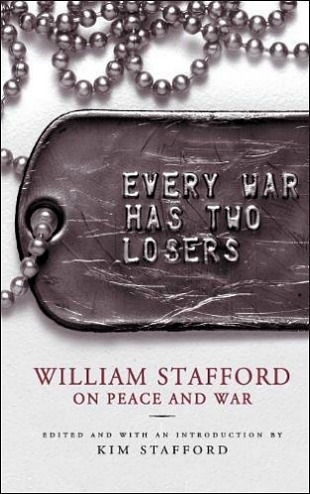William Stafford (1914-1993), a poet and winner of the National Book Award, was a lifelong advocate of peace in a century of war. A conscientious objector and pacifist, he spent 1942-1946 in Civilian Public Service camps and social agencies fighting forest fires, building and maintaining trails and roads, and training for postwar relief work. He then taught high school, worked as a secretary to the director of Church World Service, and completed his master's degree at the University of Kansas. In 1948, he joined the English faculty of Lewis & Clark College in Portland, where he taught intermittently until his retirement in 1978. Stafford is the author of 67 volumes of poetry and prose.
This volume is incredibly relevant to the present wartime situation. Kim Stafford has assembled material from his father's daily writing practice along with many poems. For over 50 years, William Stafford was a member of the Fellowship of Reconciliation, an international community of people working to create conditions of peace. He was a lifelong witness for full citizenship in the wide world of nature, many cultures, and the boundless realm of the imagination. One of the most remarkable things about this collection is the direct bearing of his thoughts on the contemporary scene.
For example, here are a few Stafford aphorisms on war:
• "Every war has two losers."
• "You may win a war you are sorry to have started."
• "Are we sort of hostages, to 'enemy 'nations? And are 'enemy' populaces sort of hostages to our military? If certain things happen, we will be bombed. And if certain other things happen, they will. Mutual hostages, held under guns."
• "Success may not mean that you did right."
There is a sharp edge to these observations which were written years ago. The wisdom of truth tellers does not age. We were moved by the eloquent and compassionate lines of "A Memorial":
"In Nagasaki they have built a little room
dark and soundproof where you can
go in all alone and close the door and cry."
Many people could use such a room near them right now. This poignant collection of prose and poems is highly recommended for all peacemakers. It is a spirit lifting resource.
